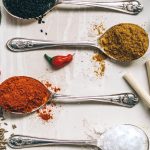Ayurveda, translating directly as ‘life-knowledge’, is an ancient Eastern health practice. Modern-day practices exist all over the world, but Western science is only recently catching up. Research in this field has been dubbed ‘ayur-nutri-genomics’, or in other words, a combination of Ayurveda, nutrition and genetics. This new science focusses on how food can play an important role on disease prevention through your nutrition.
See Also: How Understanding Ayurveda Can Change Your Life
What Do Ayurveda, Nutrition And Genetics Have In Common?
Ayurveda (pronounced i-yer-vay-da) means the knowledge or science for longevity. According to Ayurveda we all have different humours that reside in the body to help regulate its state. These humours are wind (vata), choler (pitta), and phlegm (kapha). Ayurveda merges food and natural drugs to reach a balance of these physiological factors in each person. According to what type of dosha characterizes you, there are different types of foods that will be good for your health and wellbeing. To find your dominant dosha, try out this quiz!
Likewise, nutritional genomics or nutrigenomics is the study of how foods affect our genes and how individual genetic differences can affect the way we respond to nutrients (and other naturally occurring compounds) in the foods we eat. Just like Ayurveda, nutrigenomics has great potential in the prevention, mitigation and treatment of many diseases through small but highly informative dietary changes.
According to the Center of Excellence for Nutritional Genomics (CENG) at the University of California, Davis the concept of nutrigenomics can be summarized with these five bullet points:
- We are all different and live under different environments; therefore, in some individuals, diet can be a serious risk factor for many diseases.
- Common chemicals (e.g. nutrients) found in your food can indirectly or directly have an impact on your genome by altering what good or bad genes your body expresses.
- How much your diet influences your health status can depend on your individual genetic makeup.
- There are some genes regulated by the diet which are key factors in whether a chronic disease occurs, progresses or increases its severity.
- A diet based on your individual nutritional requirements, nutritional status and your genotype (a personalised diet) can be useful in the prevention, control and cure of chronic diseases.
Practical Ways To Apply Ayurnutrigenomics
Ayurveda teaches us to combine six different tastes in our meals to achieve balance and therefore avoid anxiety and overeating. On the other hand, nutritional science indicates that it is through the combination of the different nutrients that we can reach a state of satiation and nourishment.
The tastes that Āyurveda refers to are:
- Sweet (Madhura)
- Sour (Amla)
- Salty (Lavana)
- Hot (Katu)
- Bitter (Tikta)
- Astringent (Kashai)
In a similar way, nutritional science recommends the inclusion of carbohydrates, proteins, fats, vitamins and minerals in our diet. To obtain all these nutrients naturally we must combine different types of foods, which would generally incorporate the six tastes of Ayurveda into our pallet as well. The table below shows how the combination of foods can provide you with a diversity of tastes and nutrition that will guide you into balance and wellbeing.
Ayurveda And Nutritional Recommendations
| Taste | Primary Actions | Common Sources | Nutrient/Food component |
| Sweet | Builds tissues, calms nerves | Fruit, grains, natural sugars, milk | Carbohydrates |
| Sour | Cleanses tissues, increases absorption of minerals | Sour fruits, yogurt, fermented foods | Vitamins, probiotics |
| Salty | Improves taste to food, lubricates tissues, stimulates digestion | Natural salts, sea vegetables | Minerals, fibre |
| Bitter | Detoxifies and lightens tissues | Dark leafy greens, herbs and spices | Vitamins, polyphenols |
| Pungent | Stimulates digestion and metabolism | Chili peppers, garlic, herbs and spices | Vitamins, minerals, polyphenols, antioxidants |
| Astringent | Absorbs water, tightens tissues, dries fats | Legumes, raw fruits and vegetables, herbs | Protein, vitamins, minerals, polyphenols, antioxidants, fibre |
According to The Journal of Traditional and Complementary Medicine these are some useful dietary guidelines prescribed for people of different genetic makeups which is the equivalent of your genetic constitution.
Eating for your Dosha
If you are mostly vata it is recommended that you consume foods that taste sweet, sour and salty while decreasing those that are bitter, pungent and astringent. Foods such as rice, wheat, split black gram, soybeans, most root veggies and tropical fruits are generally good for Vata-type people.
For Pitta people, go for tastes that are sweet, astringent and bitter and avoid those foods that are sour, salty and pungent. Good foods for this type include oats, barley, cabbage, cauliflower, broccoli, pomegranate and melons.
Lastly, Kapha-types should select foods that taste bitter, pungent and astringent. Corn, dry oats, peas, red kidney beans, cabbages, mushrooms, apples, pears and berries are all good choices for this type.
Of course, there are infinite variations of foods to eat based on your environment, time of the year and your daily habits. It’s always good to get the advice of a trained health professional before making any drastic changes to your existing diet.
Let Thy Food Be Thy Medicine
In sum, the idea of ayurnutrigenomics is that you find the right combination of foods and nutrients that suits your lifestyle and genetic composition to help you find balance and stay within a state of health. Listen to your body and try paying attention to the effect foods have over your mood and energy level. The lesson behind the ayurnutrigenomic diet is simple: the foods you eat have more power to heal you than you give them credit for!













